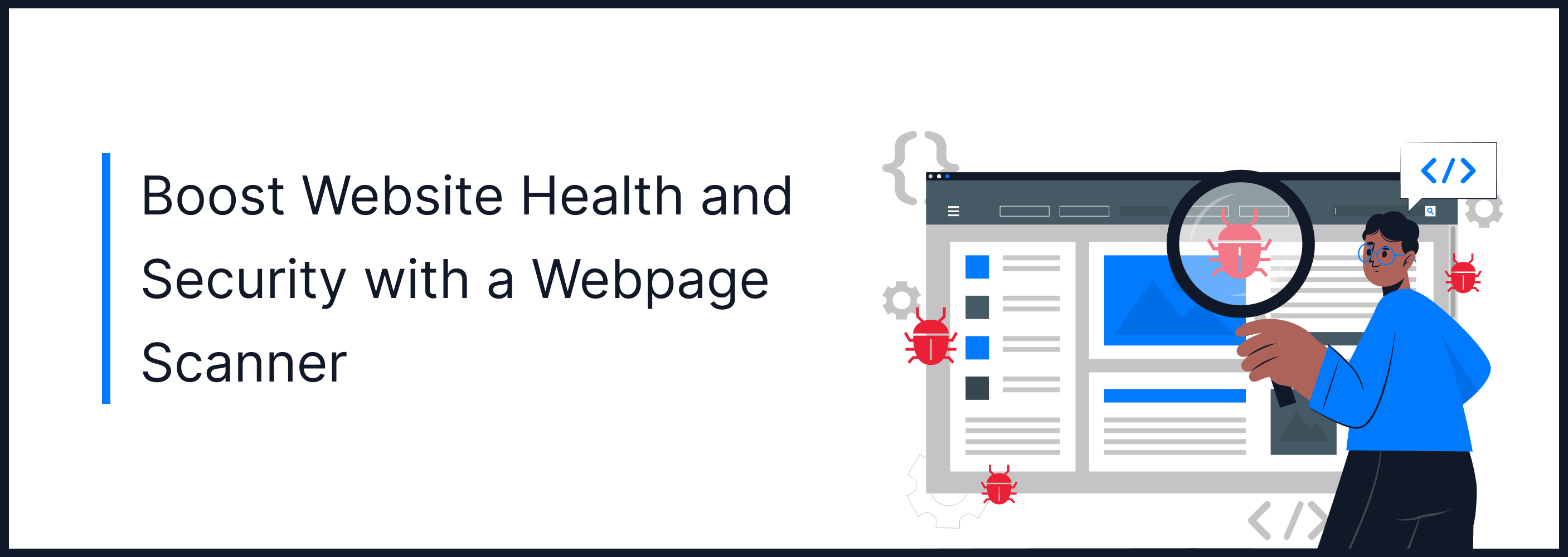
Nov 7, 2024 Information hub
Boost Website Health and Security with a Webpage Scanner
Introduction
In today’s digital age, websites are the face of businesses, organizations, and individuals alike. With the increasing reliance on the internet for information, commerce, and communication, ensuring that your website is optimized, secure, and functioning correctly is more critical than ever. This is where the concept of a webpage scanner comes into play.
A webpage scanner is a tool designed to analyze websites for various purposes, including security vulnerabilities, SEO optimization, performance issues, and compliance with web standards. Whether you’re a business owner, a web developer, or a cybersecurity professional, understanding how webpage scanners work and how they can benefit your online presence is essential.
In this comprehensive guide, we will explore the significance of webpage scanners, their relevance in today’s digital landscape, practical examples of their use, and the challenges and future developments in this field. By the end of this article, you’ll have a clear understanding of how webpage scanners can help you maintain a healthy, secure, and optimized website.
The Relevance of Webpage Scanners Today
The Growing Importance of Website Security
With the rise of cyberattacks, website security has become a top priority for businesses and individuals alike. According to a report by Cybersecurity Ventures, cybercrime is expected to cost the world $10.5 trillion annually by 2025. Websites are often the first point of attack for hackers, making it crucial to regularly scan for vulnerabilities.
A webpage scanner can help identify potential security risks, such as:
- SQL injection vulnerabilities
- Cross-site scripting (XSS) flaws
- Outdated software or plugins
- Weak passwords or authentication mechanisms
By regularly scanning your website, you can proactively address these issues before they are exploited by malicious actors.
SEO Optimization and Performance
In addition to security, webpage scanners play a vital role in ensuring that your website is optimized for search engines and performs well for users. Google and other search engines prioritize websites that load quickly, are mobile-friendly, and follow best practices for SEO.
A webpage scanner can help you identify:
- Broken links that negatively impact user experience and SEO rankings
- Slow-loading pages that can lead to higher bounce rates
- Missing meta tags or poorly optimized content
- Mobile responsiveness issues
By addressing these issues, you can improve your website’s search engine rankings and provide a better experience for your visitors.
Compliance with Web Standards
Web standards, such as the Web Content Accessibility Guidelines (WCAG), are essential for ensuring that your website is accessible to all users, including those with disabilities. Non-compliance with these standards can result in legal issues and alienate a significant portion of your audience.
A webpage scanner can help you identify areas where your website may not meet accessibility standards, such as:
- Missing alt text for images
- Inadequate color contrast
- Non-functional keyboard navigation
By ensuring compliance with web standards, you can create a more inclusive website and avoid potential legal challenges.
How Webpage Scanners Work
Types of Webpage Scanners
Webpage scanners come in various forms, each designed to address specific aspects of website analysis. The most common types include:
- Security Scanners: These tools focus on identifying vulnerabilities that could be exploited by hackers. They scan for issues such as SQL injection, cross-site scripting, and outdated software.
- SEO Scanners: These tools analyze your website’s content and structure to ensure it follows best practices for search engine optimization. They check for issues like broken links, missing meta tags, and keyword optimization.
- Performance Scanners: These tools evaluate your website’s speed and performance, identifying factors that may slow down page load times, such as large images or excessive JavaScript.
- Accessibility Scanners: These tools assess your website’s compliance with accessibility standards, such as WCAG. They check for issues like missing alt text, poor color contrast, and non-functional keyboard navigation.
- Compliance Scanners: These tools ensure that your website complies with legal and industry-specific regulations, such as GDPR or HIPAA.
How Scanning Works
Webpage scanners typically work by crawling your website, much like search engine bots do. They analyze the HTML, CSS, JavaScript, and other elements of your site to identify potential issues. Depending on the type of scanner, the tool may also simulate user interactions, such as filling out forms or clicking on links, to test for vulnerabilities or performance issues.
Most webpage scanners provide a detailed report of their findings, highlighting areas that need attention and offering recommendations for improvement.
Practical Examples of Webpage Scanners in Action
Example 1: Security Scanning for a Small Business Website
A small e-commerce business noticed a sudden drop in sales and an increase in customer complaints about suspicious activity on their website. After running a security scan using a webpage scanner, they discovered that their site had been compromised by a SQL injection attack. The scanner identified the vulnerable code, allowing the business to fix the issue and restore their website’s security.
Example 2: SEO Optimization for a Blog
A blogger was struggling to increase their website’s traffic despite regularly publishing high-quality content. After using an SEO scanner, they discovered several issues that were negatively impacting their search engine rankings, including broken links, missing meta descriptions, and slow page load times. By addressing these issues, the blogger was able to improve their website’s SEO and increase their organic traffic.
Example 3: Accessibility Compliance for a Government Website
A government agency was required to ensure that their website was accessible to all users, including those with disabilities. After running an accessibility scan, they discovered several areas where their site did not meet WCAG standards, such as missing alt text for images and poor color contrast. By making the necessary changes, the agency was able to improve their website’s accessibility and avoid potential legal challenges.
Current Trends in Webpage Scanning
AI and Machine Learning Integration
One of the most significant trends in webpage scanning is the integration of artificial intelligence (AI) and machine learning. These technologies allow scanners to become more intelligent and efficient, identifying patterns and predicting potential issues before they become critical.
For example, AI-powered security scanners can analyze vast amounts of data to identify emerging threats and vulnerabilities, while machine learning algorithms can help SEO scanners provide more accurate recommendations for content optimization.
Real-Time Scanning
Another trend is the shift towards real-time scanning. Traditional webpage scanners often require manual initiation, meaning that issues may go unnoticed for extended periods. Real-time scanners, on the other hand, continuously monitor your website for potential problems, allowing you to address them as soon as they arise.
Cloud-Based Scanning Solutions
Cloud-based webpage scanners are becoming increasingly popular due to their scalability and ease of use. These tools allow businesses to scan their websites without the need for complex on-premises infrastructure, making them accessible to organizations of all sizes.
Challenges in Webpage Scanning
False Positives and Negatives
One of the most common challenges with webpage scanners is the issue of false positives and false negatives. A false positive occurs when the scanner identifies an issue that doesn’t actually exist, while a false negative occurs when the scanner fails to detect a real problem.
For example, a security scanner may flag a harmless piece of code as a vulnerability, leading to unnecessary changes. Conversely, it may miss a critical vulnerability, leaving your website exposed to attacks.
Keeping Up with Evolving Threats
The digital landscape is constantly evolving, with new threats and vulnerabilities emerging regularly. Webpage scanners must be continuously updated to keep up with these changes, which can be a challenge for developers and users alike.
Balancing Performance and Accuracy
Webpage scanners must strike a balance between performance and accuracy. Scanning a website thoroughly can be time-consuming, especially for large sites with complex structures. However, rushing the process can result in missed issues or inaccurate results.
Future Developments in Webpage Scanning
Enhanced AI Capabilities
As AI and machine learning technologies continue to advance, we can expect webpage scanners to become even more intelligent and efficient. Future scanners may be able to predict potential issues before they occur, allowing businesses to take proactive measures to prevent problems.
Integration with DevOps and CI/CD Pipelines
Webpage scanners are likely to become more integrated with DevOps and continuous integration/continuous delivery (CI/CD) pipelines. This will allow developers to automatically scan their websites for issues during the development process, ensuring that problems are addressed before the site goes live.
Increased Focus on Privacy and Compliance
With the growing importance of data privacy and compliance, future webpage scanners will likely place a greater emphasis on ensuring that websites comply with regulations such as GDPR and CCPA. This will help businesses avoid costly fines and legal challenges.
Benefits of Using a Webpage Scanner
Improved Security
One of the most significant benefits of using a webpage scanner is improved security. By regularly scanning your website for vulnerabilities, you can identify and address potential threats before they are exploited by hackers.
Enhanced SEO and Performance
Webpage scanners can help you optimize your website for search engines and improve its performance. By addressing issues such as broken links, slow page load times, and missing meta tags, you can boost your website’s search engine rankings and provide a better experience for your visitors.
Compliance with Web Standards
Webpage scanners can help you ensure that your website complies with web standards, such as WCAG, GDPR, and HIPAA. This can help you avoid legal challenges and create a more inclusive website for all users.
Cost Savings
By identifying and addressing issues early, webpage scanners can help you avoid costly problems down the line. For example, fixing a security vulnerability before it is exploited can save you from the financial and reputational damage of a data breach.
Conclusion
In today’s digital landscape, maintaining a secure, optimized, and compliant website is essential for businesses and individuals alike. A webpage scanner is a powerful tool that can help you achieve these goals by identifying potential issues and offering recommendations for improvement.
Whether you’re concerned about security vulnerabilities, SEO optimization, performance issues, or compliance with web standards, a webpage scanner can provide valuable insights and help you maintain a healthy website. By staying informed about current trends and challenges in webpage scanning, you can ensure that your website remains secure, optimized, and accessible in the future.
Actionable Takeaways:
- Regularly scan your website for security vulnerabilities, SEO issues, and performance problems.
- Use AI-powered scanners to stay ahead of emerging threats and optimize your website more effectively.
- Ensure compliance with web standards and regulations, such as WCAG and GDPR, to avoid legal challenges.
- Consider real-time scanning solutions to continuously monitor your website for potential issues.
- Integrate webpage scanning into your DevOps and CI/CD pipelines to catch problems early in the development process.
By leveraging the power of webpage scanners, you can protect your website, improve its performance, and ensure that it meets the needs of all users.
